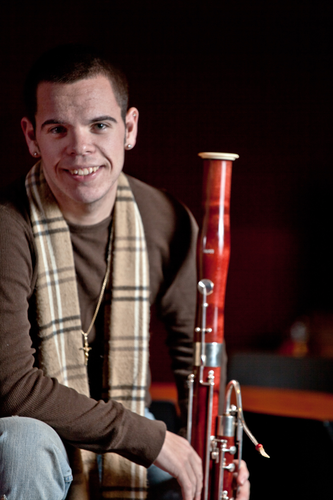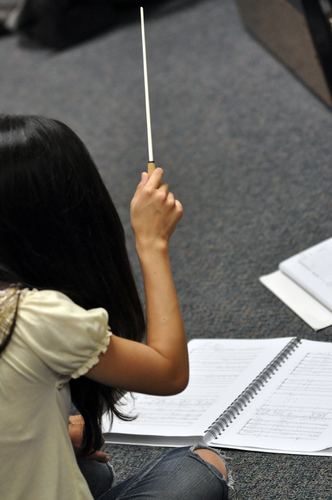Major Minors

Bassoonist Salvatore Jones declared a psychology minor in his first semester, believing it will help him land a job as a music teacher.
Photo by Elisa Rice

Students prepare for a conducting class.
Photo by Phil Farnsworth

So far, conducting is the most popular music-focused minor at the college.
Photo by Phil Farnsworth
As a college, Berklee is a little different. Most colleges don't have a mandatory ear training class, an entry audition, or a cafeteria that doubles as a venue. But like other institutions, Berklee has study-abroad programs, a long list of liberal arts courses, and now an option never before offered at the college: academic minors.
"The question always came up: Why don't we have minors? Because most institutions do," says Jeanine Cowen, assistant vice president for curriculum. Alumni said it would be helpful when applying to graduate school to "show that they had a specific, very specialized area of study."
Minors would solve a logistical problem as well, allowing students to add an academic focus without committing the full time and tuition required for a dual major.
When the college instituted a major curriculum review initiative in 2006, the time was finally ripe. To narrow down the options, administrators focused on areas where students already pieced together course clusters, and where all the necessary courses already existed, as well as subjects the college handles particularly well. Departments seemed to be interested in "more specialized channels" of study, Cowen says, rather than scaled-down version of existing majors. "It is an intensive experience but it's typically a more fine focus."
Designing the minors required innovative thinking: The video game scoring minor drew on existing film scoring classes but also plucked a course on digital narrative from the Liberal Arts Department.
A range of departments are connected by the nine resulting minors: acoustics and electronics, conducting, drama, English, music and society, performance studies in Latin music, psychology, video game scoring, and visual culture and new media studies.
They were advertised in early 2010 and launched in September to immediate enthusiasm. In the first semester, almost 150 students declared a minor. They included Rodney Bush, a seventh-semester contemporary writing and production major who's minoring in conducting—the most popular music-focused option so far.
Bush has loved conducting since childhood. It's about "the gestalt of music . . . putting it all together," he says. "I think it's really interesting to see where the connection is between music and hearing, and I think a lot of that happens with the baton." With a particular interest in musical theater, Bush assists faculty member Peter Cokkinias with Berklee's musical theater orchestra and conducts pit orchestras for musicals at the Boston Conservatory.
The contemporary conducting track is a good fit for Bush's chosen job track, which requires a broad palette of skills—learning the whole score, directing the musicians' interpretation, and matching the music with what's happening on stage—honed by the minor's courses in bandleading, orchestration, and rehearsal techniques. The Composition Department also offers conducting tracks for vocal specialists and music educators.
The most popular minor so far isn't musical, though it plays a role in every band. As of early January, 49 students had declared minors in psychology.
It came as no surprise to liberal arts chair Camille Colatosti: The Liberal Arts Department has been adding psychology courses over recent years to meet demand. Beyond the near-universal interest in personality issues among college students, "a lot of being a musician is connecting with people in various ways," Colatosti says.
The subject is especially relevant for music education and music therapy majors, many of whom go on to study psychology in graduate school.
Certainly bassoonist and music education major Salvatore Jones didn't waste time, declaring the minor in his very first semester. "There's nothing else I'd rather do than teach kids," he says, and he thought a minor in psychology would help him get there. In terms of skills, it will give him "a better background [in] understanding people," he says. In terms of credentials, it will set him apart when applying for jobs.
The courses even provide a breather in the intense Berklee schedule: "It gets us that little time off from music."
In fact, the experience is so nice Jones wants to do it twice. Students aren't currently allowed to dual-minor, but if that changes, "I'm going to double-minor in psychology and drama, so when I'm teaching high school I can do the shows," he says.
More advances are on the horizon. The college anticipates adding at least two more minors in the fall, opening up even more options for students. Some departments are prototyping new courses with an eye to creating minors. For instance, the Liberal Arts Department has been extending its language options—a natural direction for Berklee, with its one-quarter-international student body.
Whichever new options progress first, all offer students new routes to explore and succeed. As Jones thought when he submitted the psychology forms, "I just did something important in my life: I applied for a minor."
